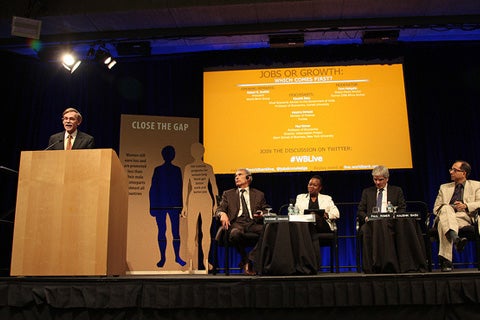From left: World Bank President Robert B. Zoellick; Hassine Dimassi, Minister of Finance, Tunisia; moderator Tumi Makgabo; Paul Romer, Professor of Economics, NYU; Kaushik Basu, Chief Economic Advisor to the Government of India
Photo: Simone D. McCourtie / World Bank
What comes first: economic growth or jobs? When do governments need a jobs strategy to reduce unemployment?
Those issues—which are at the top of many policymakers’ agendas—were debated by a panel of experts April 18, at a World Bank Live event linked to one of the World Bank’s major research efforts this year, the World Development Report 2013 on Jobs. Jobs or Growth: Which Comes First, sponsored by the WDR and a new Jobs Knowledge Platform, was liveblogged in English, French, Spanish and Arabic and drew questions from an online audience around the world.
Tunisian Minister of Finance Hassine Dimassi, India Chief Economic Advisor Kaushik Basu, and New York University economics professor Paul Romer agreed that globalization, technological and economic changes are affecting the employment picture in the modern era, but had differing views on the best approach.
"Growth is what you want. Jobs is how you get it," said Romer. He said that most successful countries have focused on employment and let growth follow. China, for example, has followed a "full employment" model, he said.
In contrast, Basu emphasized that there can be tensions between increasing jobs and increasing growth; the two do not have to go together. He argued that the government’s most important role is allowing the private sector to create jobs, though the state can play a role in job creation as part of a social safety net program. “I feel if we create the space, jobs will follow,” said Basu.
In a healthy economy, the state should play a small role in job creation, said Dimassi. “Full employment” does not have meaning without taking the quality of the job into account, he said.
Jobs are an issue in every country and are a growing focus of the World Bank, said World Bank President Robert B. Zoellick. The new WDR will, among other things, look at problems in labor markets that can be fixed, such as discrimination or institutional failures, as well as the qualities of a good job, and how societies and institutions can help more people participate in the work force.
The panelists debated whether to protect segments of the labor market, particularly if some workers remain unemployed for six months or more. One of the most dangerous trends is governments allowing young people to enter into long periods of unemployment, said Romer – a situation that poses great risks to the social fabric of society.
The challenges of employment and growth are the issues of the next decade, said Basu.
For more, check out the liveblog and webcast at World Bank Live, and additional resources at Jobs in the World Economy and the Jobs Knowledge Platform.



Join the Conversation